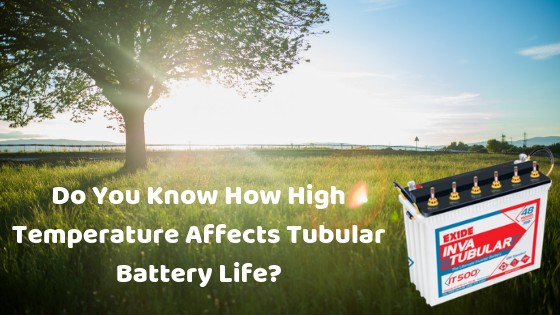Do you know that high temperature affects tubular battery life? Yes, you read it right. In summers, temperature in India crosses 40 degrees Celsius. You shouldn’t only worry about keeping kids indoor and hydrating yourself frequently – there is something else in your house which needs your immediate attention.
Your batteries which together with inverter power your house during power-cuts are at risk in hot weather. It is said that hot temperature can reduce the Inverter battery life by 50 percent.
Page Contents
How high temperature affects batteries?

To answer this question let’s understand what are batteries made of – LA/Tubular batteries which are normally used with home inverters and UPS are called wet batteries.
Also Read: Difference Between Lead Acid And Tubular Battery
Batteries contain electrolytes which are made up of sulphuric acid and water. The electrolytes are good conductors of electricity and are responsible for charging of batteries. In hot temperature the electrolytes (like any other liquid) expand.
It is simple physics: When temperature goes up then it expands and when temperature goes down then it contacts. Imagine water at 90 degrees Celsius and at 0 degrees Celsius (when it contracts and becomes ice) – it is still water but it changes its state. The same happens to the electrolyte in your batteries.
In expanded state electrolytes become from good to great conductors of electricity. They move around quickly and batteries get charged sooner at lesser charging current than they would in cold temperatures.
But your stupid inverter overcharges the batteries and supplies them high current which shortens their life.
Also Read: Be Careful! 6 Most Common Myths About Inverter Batteries
How your inverter shortens battery life?
Usually inverters do not have the capability to sense outside temperatures.
In many foreign countries such as the UK, US, Australia etc. the battery chargers are equipped with ATC Technology which means that the charger can sense outside temperature and regulate the charging accordingly. When the temperature is hot it decreases the cut-off voltage and when it is cold it increases the cut off voltage of batteries.
However in india, inverter manufacturers set inverters to charge the batteries at 27 degrees Celsius.
It means that your inverter will always charge the batteries thinking that it is 27 degrees outside even if the real temperature is 40 degrees.
Manufacturers set the cut-off voltage of 14.4 v (for tubular batteries) meaning that the inverter will only stop charging the batteries when 14.4 volts is built in the battery.
However, when it is hot the batteries need to build only 14.13 volts in order to be fully charged – anything beyond that will only overcharge the batteries. But the inverter can’t tell if it is hot or cold – it works like a dumb robot and gives a set voltage without considering temperature.
Fact: Frequently overcharging the batteries has a negative effect on their lives
It also leads to drying up of distilled water, you have to take the trouble of topping up the water. In some cases excessive overcharging can lead to release of toxic fumes which is like putting the health of your family in danger.
How to overcome high temperature issue in a battery?
Please watch this video to understand how high temperature affects the battery life and how to overcome this issue.
Always choose an inverter that is equipped with Automatic Temperature Compensation (ATC) Technology. ATC Technology means that the inverter can sense outside temperature and regulate the charging accordingly. When the temperature is hot it decreases the cut-off voltage and when it is cold it increases the cut off voltage of batteries.
Also Read: What Is An Inverter? & How Does An Inverter Work?
Inverter with ATC technology comes with a temperature sensor wire which remains in touch with the batteries to correctly judge the temperature and give right amount of charging. When it detects high temperature, the inverter automatically reduces the charging current and cut-off voltage. How intelligent!
ATC-equipped inverter will increase the battery life by a minimum of 6 months as it will never overcharge the batteries.
It will also relieve you from the trouble of frequent water-topping. You will be making huge savings on your electricity as your inverter will draw less current from the mains to charge the batteries.
Also Read: How to Increase Battery Life – Lead Acid or Wet Batteries
Got Queries? Ask with #SolarClap

Kudos. As an installer, and a graduate of Electrical/Electronic Eng’ng, l am equipped with some facts that helps me in preventive maintainance of battries and inverters.More electrons to your elbows.